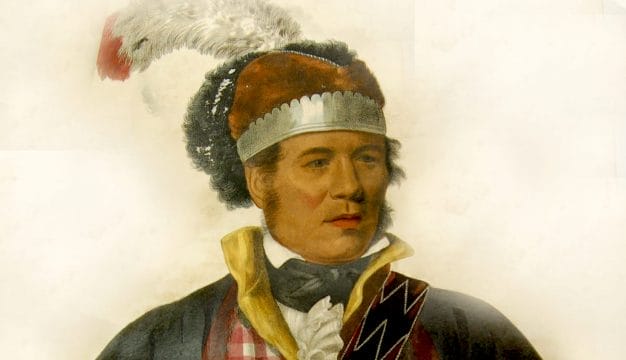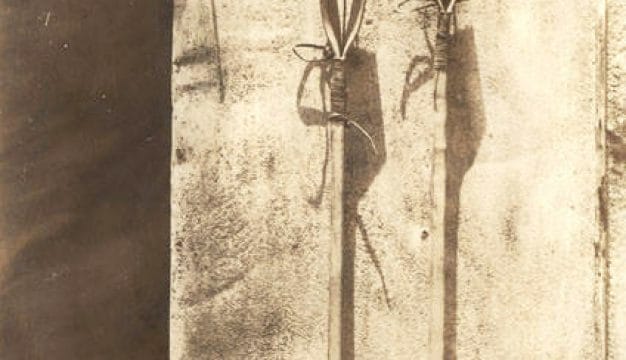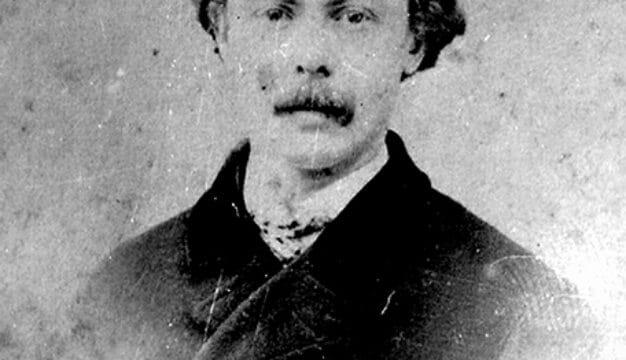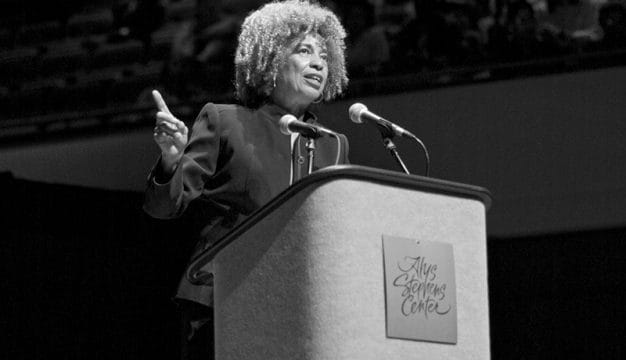Marie Bankhead Owen
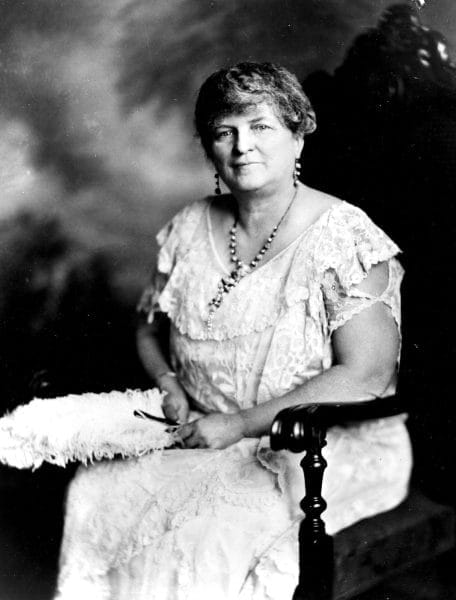 Marie Bankhead Owen
Marie Bankhead Owen (1869-1958) served for 35 years as director of the Alabama Department of Archives and History (ADAH) and was only the second woman to head a state agency. Owen was an accomplished author and wrote numerous columns, books, and articles. She was also active in civic groups and was a vocal opponent of woman suffrage and civil rights. She came from a distinguished and nationally prominent Alabama family and was married to Thomas McAdory Owen, the first director of ADAH.
Marie Bankhead Owen
Marie Bankhead Owen (1869-1958) served for 35 years as director of the Alabama Department of Archives and History (ADAH) and was only the second woman to head a state agency. Owen was an accomplished author and wrote numerous columns, books, and articles. She was also active in civic groups and was a vocal opponent of woman suffrage and civil rights. She came from a distinguished and nationally prominent Alabama family and was married to Thomas McAdory Owen, the first director of ADAH.
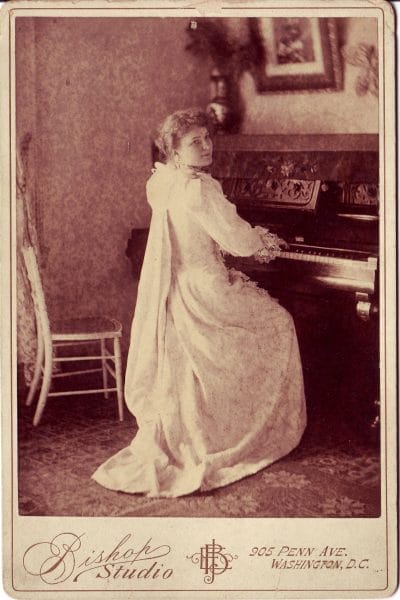 Marie Bankhead ca. 1893
Marie Bankhead was born on September 1, 1869, in Noxubee County, Mississippi, on the old Bankhead plantation, the daughter of future Alabama congressman and senator John H. Bankhead and Tallulah J. Brockman Bankhead, both established residents of Alabama. Marie had three younger brothers: John H. Bankhead Jr., who served in the U.S. Senate; William B. Bankhead, who served as Speaker of the U.S. House of Representatives; and Henry M. Bankhead, an army officer. She attended Ward’s Seminary, a finishing school in Nashville, Tennessee, that trained girls from elite families in cultural and social subjects. After graduation, she spent the winter in Washington, D.C., with her father, traveled to Europe, and rejoined her family in Alabama. In 1887, Marie met her future husband Thomas M. Owen, the oldest of nine children of a physician, at the University of Alabama commencement in Tuscaloosa, where he graduated with high honors. Despite her family’s reservations about Thomas Owen’s inferior financial status, the two wed on April 12, 1893. They had two sons, Thomas McAdory Owen Jr. in 1894, and John Hollis Bankhead Owen in 1895, who died at the age of five.
Marie Bankhead ca. 1893
Marie Bankhead was born on September 1, 1869, in Noxubee County, Mississippi, on the old Bankhead plantation, the daughter of future Alabama congressman and senator John H. Bankhead and Tallulah J. Brockman Bankhead, both established residents of Alabama. Marie had three younger brothers: John H. Bankhead Jr., who served in the U.S. Senate; William B. Bankhead, who served as Speaker of the U.S. House of Representatives; and Henry M. Bankhead, an army officer. She attended Ward’s Seminary, a finishing school in Nashville, Tennessee, that trained girls from elite families in cultural and social subjects. After graduation, she spent the winter in Washington, D.C., with her father, traveled to Europe, and rejoined her family in Alabama. In 1887, Marie met her future husband Thomas M. Owen, the oldest of nine children of a physician, at the University of Alabama commencement in Tuscaloosa, where he graduated with high honors. Despite her family’s reservations about Thomas Owen’s inferior financial status, the two wed on April 12, 1893. They had two sons, Thomas McAdory Owen Jr. in 1894, and John Hollis Bankhead Owen in 1895, who died at the age of five.
Thomas practiced law and secured a brief appointment in Washington, D.C., moving his family there for about three years before returning to Alabama. In Washington, Marie used her family connections to assist Owen in successfully lobbying the state legislature to establish the Alabama History Commission (now defunct), which led to the creation of a department to preserve the state’s history. In 1901, the state legislature officially established ADAH, and the trustees at its first meeting nominated Thomas Owen to head the new department, the first of its kind in the nation. Marie and the children settled in Montgomery, where she and her husband briefly cared for her young niece and future acting star, Tallulah Bankhead.
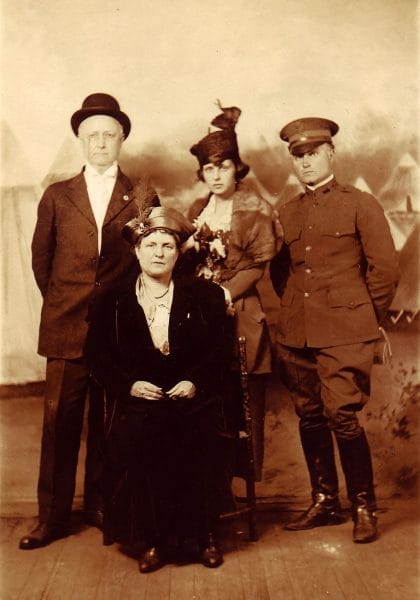 Owen Family
In the early twentieth century, Marie began writing for Uncle Remus’s Magazine and Southern Woman Magazine and in 1911 became the Montgomery Advertiser‘s society editor and later served as a feature writer and editor until 1917. Her occasional column “Talks with Girls” achieved such acclaim that a New York newspaper offered her a position, which she declined. Marie served as president of the League of Southern Writers from 1916 to 1917 and participated in other literary groups. For Alabama’s centennial in 1919, she wrote six historical plays and four school-oriented histories. Marie also penned other plays and manuscripts and published a novel, Yvonne of Braithwaite, in 1927.
Owen Family
In the early twentieth century, Marie began writing for Uncle Remus’s Magazine and Southern Woman Magazine and in 1911 became the Montgomery Advertiser‘s society editor and later served as a feature writer and editor until 1917. Her occasional column “Talks with Girls” achieved such acclaim that a New York newspaper offered her a position, which she declined. Marie served as president of the League of Southern Writers from 1916 to 1917 and participated in other literary groups. For Alabama’s centennial in 1919, she wrote six historical plays and four school-oriented histories. Marie also penned other plays and manuscripts and published a novel, Yvonne of Braithwaite, in 1927.
In accordance with the expectations of her socioeconomic class, Marie involved herself as a club woman and civic leader. She corresponded with members of the Daughters of the American Revolution and the United Daughters of the Confederacy and, in 1913, served as president-general of the woman’s auxiliary of the Southern Commercial Congress, a forum that worked to promote legislation addressing vocational education and other issues with particular relevance to the South. She also served as state chair of the National League for Woman’s Service from 1916 to 1918. Through these organizations she promoted teaching Alabama history in schools, and her peers described her as being an adept lobbyist on behalf of history, education, and civics.
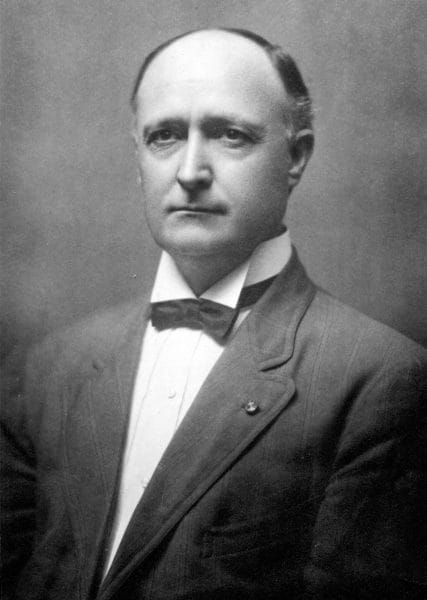 Thomas McAdory Owen
Marie served as legislative chair for the Women’s Anti-Ratification League, a group formed in 1919 to oppose Alabama’s adoption of the Nineteenth Amendment to the U.S. Constitution, which would grant women the right to vote. The league’s members argued in a letter to the legislature that women should be restricted to exerting their influence by maintaining supremacy in the home, rather than by extending it into the political sphere. The league also opposed federal government intrusion into what they claimed was a states’-rights issue, promoted white supremacy, and asserted that the amendment might reopen racial issues related to the enfranchisement of African Americans. The organization helped defeat the amendment in 1919, but by July 1920, the required number of states had ratified the amendment.
Thomas McAdory Owen
Marie served as legislative chair for the Women’s Anti-Ratification League, a group formed in 1919 to oppose Alabama’s adoption of the Nineteenth Amendment to the U.S. Constitution, which would grant women the right to vote. The league’s members argued in a letter to the legislature that women should be restricted to exerting their influence by maintaining supremacy in the home, rather than by extending it into the political sphere. The league also opposed federal government intrusion into what they claimed was a states’-rights issue, promoted white supremacy, and asserted that the amendment might reopen racial issues related to the enfranchisement of African Americans. The organization helped defeat the amendment in 1919, but by July 1920, the required number of states had ratified the amendment.
At age 50, Marie lost both her father and her husband within a month, and the ADAH board of trustees appointed her director on April 1, 1920. The following year, Marie completed and published Thomas Owen’s four-volume History of Alabama and Dictionary of Alabama Biography. Continuing her husband’s endeavors, she lectured and wrote textbooks and histories, including Alabama: A Social and Economic History of the State.
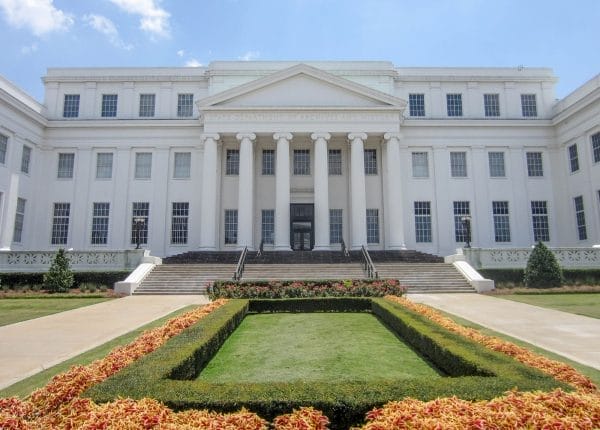 Alabama Department of Archives and History
The politically astute Marie convinced Gov. Bibb Graves to meet with Pres. Franklin Roosevelt’s chief of staff Harry Hopkins to request federal funding for completion of an archives building in Alabama. Hopkins dismissed the request immediately but changed his mind when Graves mentioned that Owen was not only the daughter of former senator John Hollis Bankhead, but she was also the sister of Sen. John Bankhead Jr. and William B. Bankhead, Speaker of the House of Representatives. Perhaps her most important accomplishment was her success in securing Federal Emergency Relief Administration funding to complete the World War Memorial Building. When another state department lobbied to subdivide ADAH and take over the new War Memorial Building in 1939, Owen fiercely opposed the proposal before a legislative committee and thus obtained the nickname “Tiger Woman.” The ADAH offices relocated to the building in 1940 and continue to occupy the space today.
Alabama Department of Archives and History
The politically astute Marie convinced Gov. Bibb Graves to meet with Pres. Franklin Roosevelt’s chief of staff Harry Hopkins to request federal funding for completion of an archives building in Alabama. Hopkins dismissed the request immediately but changed his mind when Graves mentioned that Owen was not only the daughter of former senator John Hollis Bankhead, but she was also the sister of Sen. John Bankhead Jr. and William B. Bankhead, Speaker of the House of Representatives. Perhaps her most important accomplishment was her success in securing Federal Emergency Relief Administration funding to complete the World War Memorial Building. When another state department lobbied to subdivide ADAH and take over the new War Memorial Building in 1939, Owen fiercely opposed the proposal before a legislative committee and thus obtained the nickname “Tiger Woman.” The ADAH offices relocated to the building in 1940 and continue to occupy the space today.
During collaboration on Alabama’s design for an official coat of arms, Owen sought a phrase that represented the state’s character and selected “We dare maintain our rights” or “We dare defend our rights” from a poem. It was translated into Latin on the coat of arms as audemus jura nostra defedere, and the legislature later adopted the phrase as the state’s motto. Heavily influenced by her family’s southern-Democrat political beliefs, Marie accepted the concept of white supremacy unquestioningly. In 1948, she agreed to chair the women’s division in the state’s-rights Democratic movement, which later came to be known as the Dixiecrats. She vowed to help then-South Carolina governor Strom Thurmond defeat a civil-rights bill pending in Congress. Thurmond’s later loss in his bid for the presidency did not dissuade Owen from her state’s-rights platform.
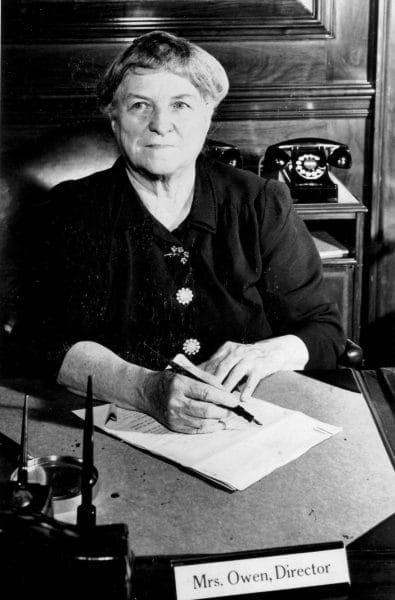 Marie Bankhead Owen at ADAH
Affectionately known as “Miss Marie,” Owen viewed ADAH’s role as promoter of the state’s cultural values rather than simply a repository of its history. The archives itself served as an archives, museum, and library, and she worked to develop a traveling library system. In her role as director, she served extensively on boards and commissions, such as the Confederate Pension Board, Alabama Centennial Commission, Alabama Memorial World War Commission, Capitol Building Commission, State Park Commission, Memorial Building Commission, and the Fine Arts Commission, to name just a few. She continued to make public speeches throughout her life. She acted as a writer, historian, civic worker, and public servant. Influenced by the white southern values of her time, she advocated for Alabama, though not for all Alabamians. Owen retired as director in 1955 and died on March 2, 1958, at the Dunn Rest Home in Selma. Marie Bankhead Owen was inducted into the Alabama Women’s Hall of Fame in 1975, and the ADAH stands as a lasting testament to her legacy.
Marie Bankhead Owen at ADAH
Affectionately known as “Miss Marie,” Owen viewed ADAH’s role as promoter of the state’s cultural values rather than simply a repository of its history. The archives itself served as an archives, museum, and library, and she worked to develop a traveling library system. In her role as director, she served extensively on boards and commissions, such as the Confederate Pension Board, Alabama Centennial Commission, Alabama Memorial World War Commission, Capitol Building Commission, State Park Commission, Memorial Building Commission, and the Fine Arts Commission, to name just a few. She continued to make public speeches throughout her life. She acted as a writer, historian, civic worker, and public servant. Influenced by the white southern values of her time, she advocated for Alabama, though not for all Alabamians. Owen retired as director in 1955 and died on March 2, 1958, at the Dunn Rest Home in Selma. Marie Bankhead Owen was inducted into the Alabama Women’s Hall of Fame in 1975, and the ADAH stands as a lasting testament to her legacy.
Further Reading
- Alabama Department of Archives and History. Marie Bankhead Owen Papers, Unprocessed Collection.
- Noles, James L. Hearts of Dixie: Fifty Alabamians and the State They Called Home. Birmingham, Ala.: Will Publishing, 2004.
- Simpson, Robert R. “The Origins of the Alabama Department of Archives and History.” Alabama Historical Quarterly 34 (Summer 1972): 155-70.
